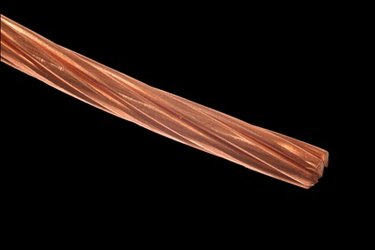
To transport electric current, electric wires need to be composed of a material that has high conductivity. A conductor is any material than transports an electrical current when there is a potential difference between two separate points across the material. Most conductors are metallic. Copper is the most common metal used for electrical wiring.
Characteristics
Video of the Day
The characteristics that make copper the number one choice for a conductor include strength, durability, malleability and affordability. Humans have searched for a substitute for copper but have failed to find another material as reliable and economical as copper.
Video of the Day
Conduction
Copper can carry more electrical current per area of wire than any other nonprecious metal. Silver is a better conductor; however, its high price makes it uneconomical. The prices of metals fluctuate rapidly; however, for perspective, as of May 2010, silver sold for $18.42 per ounce, whereas copper cost about $3.17 per pound.
Malleability
Copper is very malleable, which means that the metal bends and shapes easily. This makes it easy to shape copper into wire. Copper can also be easily joined and soldered together, unlike substitute materials. Just because copper is malleable does not mean that it is not strong. Copper's high melting point enables it to take current overloads and surges without danger. Current, or load surges, can wreck havoc with a wiring system.
Compatibility
Copper is naturally compatible with itself. Because copper is used to wire homes, by default it is also used in most appliances and electrical equipment. Copper is not compatible with other metals, such as aluminum. If the two metals are joined, a galvanic action can occur, and corrosion can disintegrate the aluminum. This is why most appliance and electrical equipment manufacturers use copper wires. Copper is the only wiring approved by all electrical codes nationwide.
Corrosion Resistance
Copper is very resistant to corrosion. This is an important safety feature. If home wiring were to corrode and crack, it is possible the wiring can arc and start a fire. Copper roofing in rural atmospheres has been found to corrode at rates of less than 0.4 mm in 200 years.
Availability
It would not matter how great a conductor copper was if it were not readily available. Copper is the most widely used metal in the present-day market. There are plenty of copper mines and refining facilities across the world.